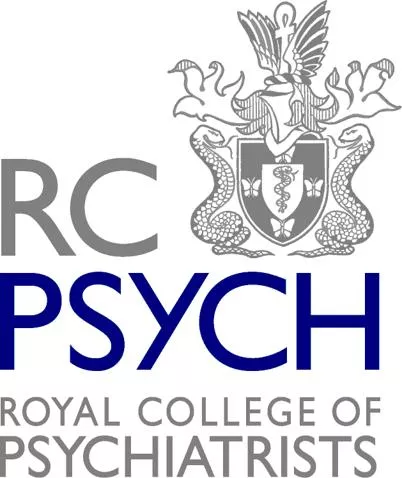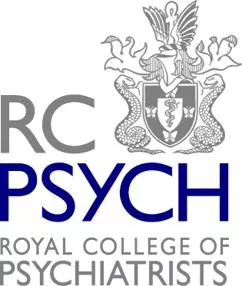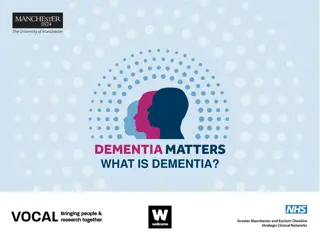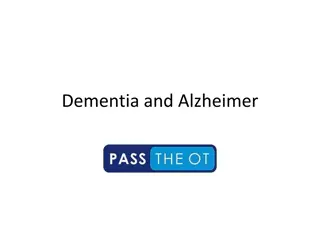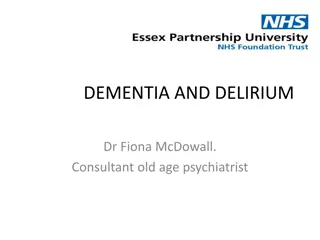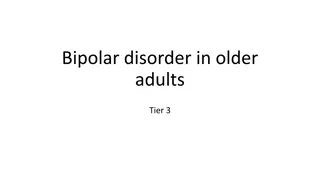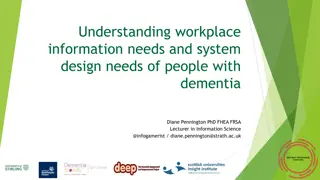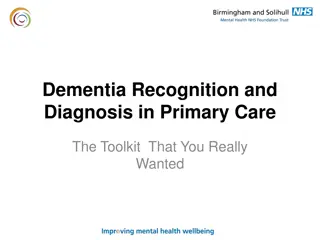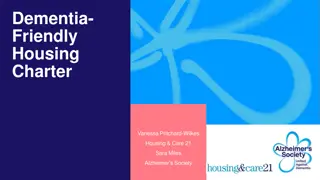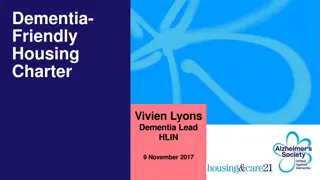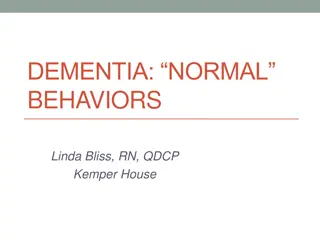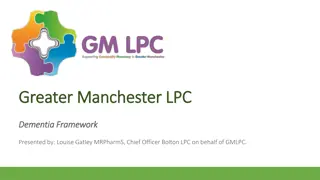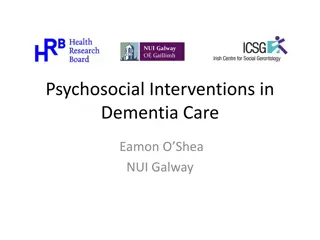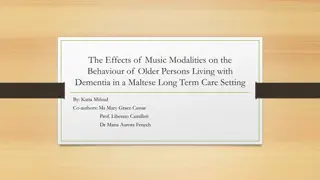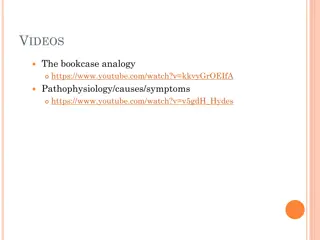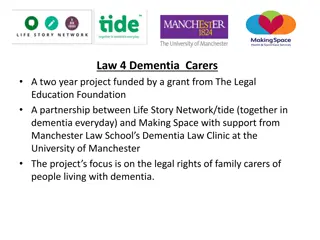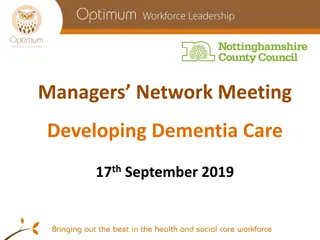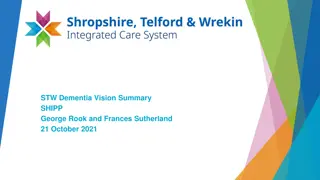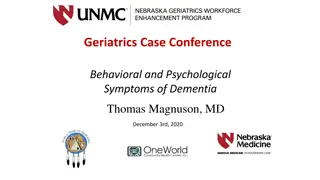Understanding Young Onset Dementia: Assessment and Diagnosis Webinar
In this informative webinar led by Dr. Janet Carter and other experts, various aspects of young onset dementia are explored, including typical presentations, key red flags in history, required investigations, genetic testing importance, and social implications. The session delves into the unique challenges of diagnosing dementia in individuals under 65, highlighting case vignettes and facets of assessment crucial for accurate diagnosis and management.
Download Presentation

Please find below an Image/Link to download the presentation.
The content on the website is provided AS IS for your information and personal use only. It may not be sold, licensed, or shared on other websites without obtaining consent from the author. Download presentation by click this link. If you encounter any issues during the download, it is possible that the publisher has removed the file from their server.
E N D
Presentation Transcript
Young Onset Dementia Webinar Dr Janet Carter Associate Professor of Old Age Psychiatry UCL Division of Psychiatry Consultant in OAP, NELFT Dr Paul Gallagher ST7 Psychiatry Dual Trainee, ELFT Dr Joanne Hew ST4 Psychiatry Dual Trainee, ELFT Dr Mohan Bhat Academic Secretary Faculty of Old Age Psychiatry Consultant in OAP, NELFT
Audience poll What is your professional background?
Learning Objectives Provide some examples of typical presentations encountered in young onset dementias Identify key red flags in the history Describe the investigations and cognitive testing required to establish a diagnosis of young onset dementia Identify the importance of genetic testing in young onset dementia Describe the wider social context of a diagnosis of young onset dementia To be aware of the barriers in current service models and what constitutes good practice
Young Onset Dementia (YOD) Dementia presenting under age of 65 years Accounts for approximately 5.5% of dementia diagnoses in the UK Diverse clinical presentations, differing from older onset Greater impact on psychosocial functioning Rarer dementia types over-represented Alzheimer's remains common (atypical presentations) Frontotemporal dementia (behavioural variant) also common
Case Vignette (Background) Mr MG, 62 year old male 2 year history of progressive decline in short term memory and word finding difficulties Making extensive use of notes as reminders Not recalling points of technical language Recent redundancy (1 year previously) describes he has been more anxious since then Lives with wife, 2 children aged 15 and 17 and remains independent in ADLs How do we proceed with the assessment?
Facets of assessment History Psychiatric history Family history Collateral history Mental state examination Neurological examination Cognitive screening Imaging Biological investigations
Psychiatric history Observed the memory difficulties before the redundancy Taking on contracting work following redundancy Still having memory problems, but relies extensively on notes More anxious since redundancy No other reported mood symptoms No prior psychiatric contacts No current psychotic features
Family history Maternal grandmother Alzheimer's dementia (uncertain of age) Mother Alzheimer's dementia aged 63 Maternal aunt died in mid-fifties Younger brother Clinical diagnosis of Fronto-Temporal Dementia No genetic testing Diagnosed aged 43, died aged 48
Collateral History No observed personality or behaviour changes Eating & sleeping well Managing ADLs without any difficulty Jerky movements Observed through the day 3-4 times a night, sleep not interrupted. Premorbid Open, calm and laid back.
Examinations Mental state unremarkable Cognitive Screening (ACE III) Total 89/100 Attention 18/18 Fluency 11/14 Memory 19/26 Language 25/26 Visuospatial 16/16 Neurological examination Myoclonic jerks observed, otherwise unremarkable Concluded Diagnosis Amnestic MCI
Indicators of Young Onset Dementia Collateral history Behaviour changes (loss of sympathy, empathy, compulsive behaviours) Changes in appetite preference, swallowing problems, oral fixation Occupational history, level of daily function Change in sleep pattern Change in ability to read and write Family history Three generations (if possible) First degree relative with YOD
Indicators of Young Onset Dementia Neurological examination Cerebellar signs Fasciculation Extra-pyramidal features e.g. parkinsonism, abnormal movements Cognitive assessment Praxis impairment Frontal release signs Use of standardised cognitive tools (Frontal Assessment Battery)
Delays to diagnosis Diagnosis often encounters delays Longer time to diagnosis (mean time 3.5 years - additional 1.6 years) Younger age, personal history of depression, dementia other than AD or FTD, increased number of services consulted Consulted an average of 3 clinicians prior to diagnosis Frequently diagnosed with psychiatric disorder in early stages delay 3-10 years Level of cognitive impairment not associated with length of delay
What gets overlooked in assessment Assessment of neurological symptoms Cerebellar signs Parkinsonism Assessment of Praxis Review of behaviour changes Standardised neuro-imaging protocol (MRI T1, T2 & FLAIR) Review of the needs of the patient & carer(s) before assessment
Differentiating from mood disorders Psychiatric history Mental state examination Characteristic changes in speech e.g. dysfluent, effortful Abnormal perceptions Abnormal beliefs Mood symptoms Use of a validated rating scale (e.g. Geriatric Depression Scale, Beck Depression Inventory, Hamilton Anxiety & Depression Scale)
Case Vignette Mr MG Initial diagnosis: Amnestic MCI Remained under services, had repeat assessment after 1 year ACE-3 score to 85/100 Memory subset domain deteriorating to 15/26 More concerns about deterioration in ADLs Had applied for 4 jobs in the last year and reported difficulties in organising himself . Appears to have lost his jobs due to difficulty functioning appropriately at work. What are the next steps for investigation?
Further testing genetics Alzheimer s disease First person to be assessed must be affected i.e. symptomatic vs predictive testing in family members - importance of FHx ALZHEIMER S DISEASE Affected family in 3 generations Age of onset <60 YRS Probability of genetic mutation 86% GENETIC MUTATIONS GENES APP PSEN1 (COMMONEST) PSEN2 Two or more affected first- degree relatives <65YRS 15% Two or more affected first- degree relatives >65YRS <1%
Further testing genetics Familial FTD About 30% FTD is genetic It is inherited in Autosomal dominant fashion BvFTD accounts for 60% of cases most highly heritable Genetic testing may be predictive for children of the person with FTD Gene Chromosome location 9 Clinical characteristics Bv FTD / FTD-MND C9orf72* * Psychosis may precede dementia by years MAPT 17 Bv FTD Parkinson s plus syndromes bvFTD PPA/CBS GRN 17
Audience poll What imaging is available for you to use? (Tick all that apply)
Further testing imaging Less likely to find changes on imaging in YOD Richard et al (2014), Talbot et al (1998), Sala & Perani (2019), Sampson et al (2004), O Malley et al (2019)
Further testing blood Sampson et al (2004)
Further testing CSF Sampson et al (2004), O Malley et al (2019)
Further testing EEG, sleep studies Sampson et al (2004)
Case vignette Mr MG Referred to genetic clinic for pre-testing counselling and genetic testing Test showed PSEN1 mutation MRI head Unremarkable Blood screen NAD Diagnosed with young onset Alzheimer s disease Note different diagnosis concluded compared to brother
Social history (update) Mr MG is sole breadwinner of the family, family now having to use savings as Mr MG s contract work is sporadic Older child has started university, younger child in 6th form Wife s father unwell with physical health problems, he has moved in with them and they are looking after him
Impact of diagnosis Wide variation in the support requirements arising primarily from stage of life at diagnosis Vastly different to older people living with dementia 10.4% living with children in their homes Possible carers for a parent living with YOD 5.6% currently employed 15% living alone 60% requiring significant support (>5 hours daily) from family Many requiring in excess of 8 hours daily Loss of income from family members and individual (although many lose job prior to diagnosis and opportunity for vocational rehab is lost) Stamou et al (2020)
Case vignette Mr MG Genetic counselling for children Vocational support Financial advice (Lasting Power of Attorney) Future healthcare decisions (Advance Directives)
Conclusions about the case Detailed family history (3 generations if possible) Genetic testing Neurological examination (especially praxis / frontal lobe functions) Access to specialist imaging early in diagnostic journey Anything else?
Audience poll What services are available for individuals with YOD in your area? (Tick all that apply)
Current services Heterogenous route to diagnosis (UK Study) More than 1 in 3 diagnoses made in memory clinic Around 1 in 4 diagnoses in neurology clinic Less that 1 in 5 specialist YOD service / older adults mental health service 42% reported no follow up 6 weeks after diagnosis 70% of family members had no carers group or respite care Care managed by: 1/5 managed solely by specialist YOD service 1/5 managed by GP 16% nobody managed care Stamou et al (2020) Loi et al (2020)
What do patients/carers want from services? https://www.youngdementiauk.org/support-needs-films
Research from Angela Project People with YOD want: Young onset specific information, advice and support to stay independent Age-appropriate support to stay fit, active and mentally well Age-appropriate activity and occupation to maintain identity Carers of people with YOD want: Specialist support to know how to care for issues specific to young onset dementia Support to retain life beyond caring, such as employment Both carers and people with YOD want: To feel connected with each other To feel connected with friends or others who understand challenges of living with young onset dementia To have opportunities to contribute to wider society
Gold standard services Satisfaction and quality of care highest in specialist services Specialist services more likely to offer follow up within 6 weeks, ongoing care management appointments, and care planning Streamlined diagnostic pathway Appropriate investigations and timely diagnosis Flexible, person-centric and age appropriate Financial and employment issues, management of comorbid psychiatric symptoms, provide meaningful and stimulating activities. Acknowledge role of caregiver, and provide support for them: perceived lack of recognition, lack of understanding of symptoms and early recognition, gaining access to social and professional support. Loi et al (2020), Stamou et al (2020)
References Brown KJ, Bohnen NI, Wong KK, Minoshima S and Frey KA (2014) Brain PET in Suspected Dementia: Patterns of Altered FDG Metabolism Radiographics : a Review Publication of the Radiological Society of North America, 34(3):684-701 Loi SM, Goh AMY, Mocellin R, Malpas CB, Parker S, Eratne D, Farrand S, Kelso W, Evans A, Walterfang M, Velakoulis D (2020)Time to diagnosis in younger-onset dementia and the impact of a specialist diagnostic service Int Psychogeriatrics 28;1-9. doi: 10.1017/S1041610220001489 O Malley M, Parkes J, Stamou V, LaFontaine J, Oyebode J and Carter J(2019) Young-onset dementia: scoping review of key pointers to diagnostic accuracy BJPsych Open 5, e48, 1 9. doi: 10.1192/bjo.2019.36 Sala A and Perani D (2019) Brain Molecular Connectivity in Neurodegenerative Diseases: Recent Advances and New Perspectives Using Positron Emission Tomography Front. Neurosci. doi: 10.3389/fnins.2019.00617 Sampson EL, Warren JD and Rossor MN (2004) Young onset dementia Postgrad Med J 80:125 139. doi: 10.1136/pgmj.2003.011171 Stamou V, La Fontaine J, Gage H, Jones B, Williams P, O'Malley M, Parkes J, Carter J, Oyebode J. (2020) Services for people with young onset dementia: The 'Angela' project national UK survey of service use and satisfaction. Int J Geriatr Psychiatry. doi: 10.1002/gps.5437. Epub ahead of print. PMID: 32979287 Stamou V, La Fontaine J, O Malley M, Jones B, Gage H, Parkes J, Carter J and Oyebode J (2020) The nature of positive post-diagnostic support as experienced by people with young onset dementia, Aging & Mental Health, DOI: 10.1080/13607863.2020.1727854 Talbot PR, Lloyd JJ, Snowden JS, et al (1998) A clinical role for99mTc-HMPAO SPECT in the investigation of dementia? Journal of Neurology, Neurosurgery & Psychiatry 64:306-313.
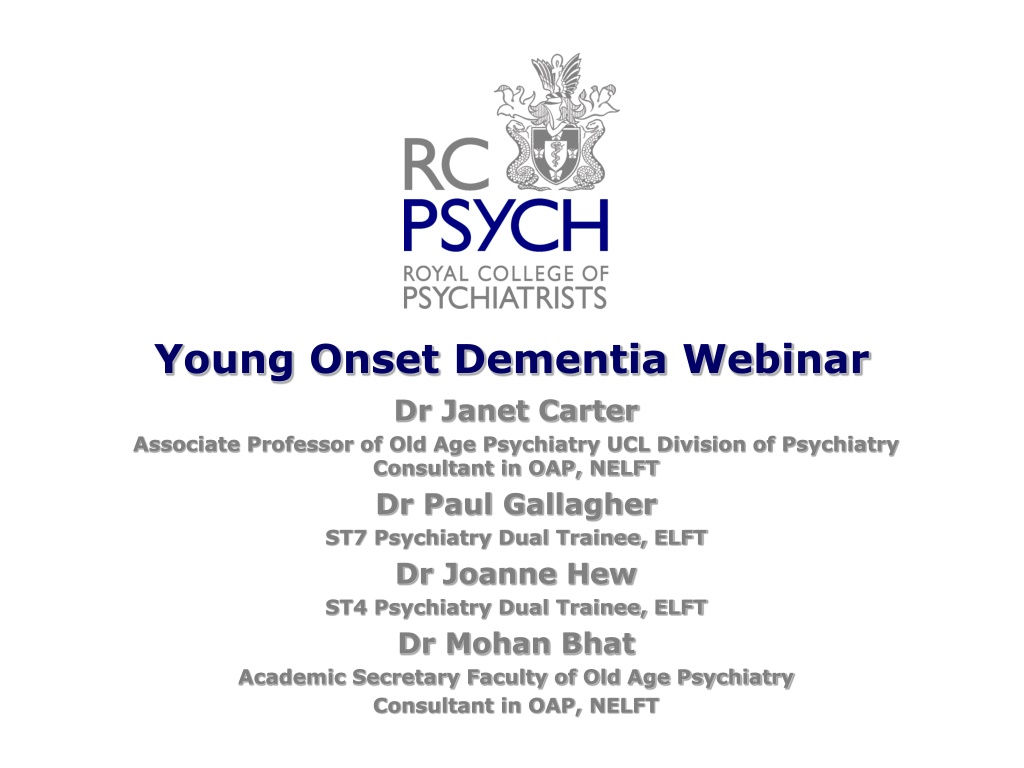
 undefined
undefined